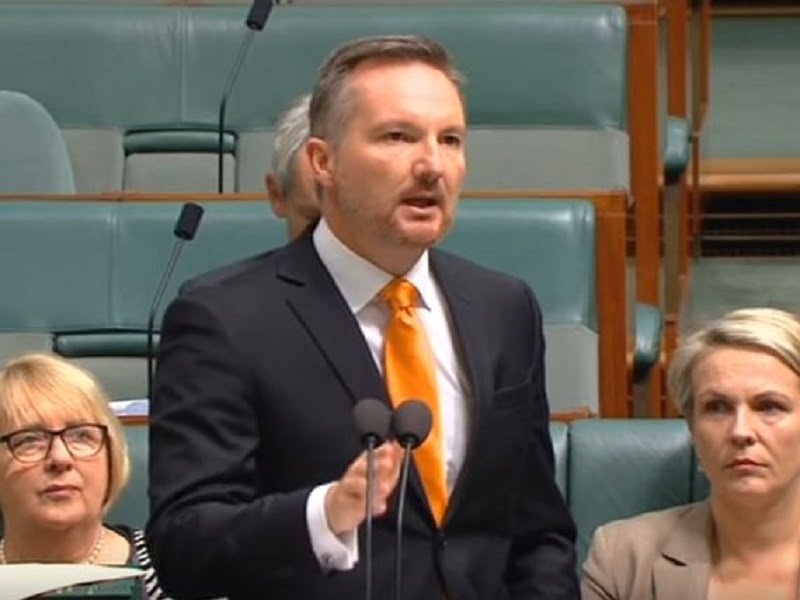Labor’s Chris Bowen did the tech and innovation industry a huge favour last week by going out so hard against the Turnbull Government’s stop-start policy enthusiasm for the sector.
When the shadow treasurer is staking out a political position that says the opposition will “own” innovation policy in the run-up to the next election, you might guess the actual treasurer will turn up the volume on the government’s own innovation narrative.
We will find out later today when the Treasurer steps up to the dispatch box. Science, research, technology and tech-enabled startups have all been stung this year – first by the weird handling of the R&D tax interpretations and then by out-of-nowhere changes to the temporary skills visas.

You would think that Scott Morrison might apply some soothing balm to these ailments, given the industry’s noisy, squeaky wheel response.
Regardless, Mr Bowen is shaping an agenda that combines two potent if ephemeral electoral themes – ‘innovation’ and ‘fairness’.
In a headland speech to an audience of fintech startups at the Stone & Chalk incubator in Sydney, Mr Bowen made the case for tying ‘innovation’ to policies of inclusiveness across geographies and demographics.
Rather than taking it as an article of faith that the rising tide will raise all boats, he’s saying we need targeted policies to ensure everyone is in a boat in the first place.
Some might argue that there connecting the protection of a strong minimum wage and penalty rates and innovation policy is a long bow to draw. But Mr Bowen is arguing these are essential fairness issues that must be actively and specifically addressed.
Failure to do so, he says, presents problems Australians don’t want: A hollowing out of the middle-class, unevenly distributed wealth, and all the social distress that comes from those things.
“It is incumbent on all of us; those in the government sector and those in the entrepreneurial sector to ensure the potential growth is spread through our society,” Mr Bowen said.
“This has to be central to the discussion around innovation into the future; building breadth into the effort, including the many not the few.”
This is a speech worth reading prior to the Treasurer’s budget tonight. He is not talking about spreading the wealth as the ‘fairness’ test, although this is obviously a part of it, but rather about spreading the jobs.
Mr Bowen is not the only one thinking about these things, and Labor’s best thinker on “jobs of the future’ is Ed Husic, the shadow minister for workforce participation.
Here’s the thing. Labor is not our there announcing new policy. It is too early in the electoral cycle. But it is underlining its core policy focuses. That includes innovation policies that target the regions and the outer metropolitan areas and the regional innovation fund and regional innovation centres that Labor took to the last election.
It also included some early thinking on protecting wages against a backdrop of gig economy platforms.
By for the most interesting thing that has happened in the Australian startup sector this year was the agreement – announced last week – between Unions NSW and AirTasker on a model to protect incomes and livelihoods while growing wealth at the same time.
“We all should be impressed,” Mr Bowen said. This is a single agreement between one company and one set of union representative, but its Australian characteristics are compelling. Whether such arrangements can be broadened or formalised into the existing industrial relations infrastructure is a discussion for another time.
“The first thing we need to do is to welcome [the agreement],” Mr Bowen told InnovationAus.com. “This shows what’s possible, and that it doesn’t have to be a confrontational arrangement [although] I’m sure they had some very robust discussions.
“If there is a template that arises from it, and if there is a role for various tribunals to play, well that’s for further down the track,” he said. “But I really think you need to point to the achievement and say ‘these things are possible.’”
Labor’s focus on shifting the creative capacity of entrepreneurs and innovation policy from a CBD focus to include the outer metropolitan areas and regions runs counter to startup lobbying for a focus on density.
Mr Bowen and Mr Husic have underlined an outlook that says you need both. In response a query from Dean McEvoy on the need for startup density, Mr Bowen said it does not pass the fairness test – and it doesn’t make sense if you are trying to build communities and build capacity outside of CBDs.
“It’s our job to get the balance right. But we can’t focus all the money on one area. We can’t. It would be wrong,” Mr Bowen said.
“As important as everything that happens here [among startups in the CBD] is, the story cannot be just about the Sydney and Melbourne CBD. Because we will lose the argument,” he said.
Targeted regional innovation programs work. “I’ve seen it first-hand. I’ve seen it in Geelong, I’ve seen it in Bendigo and I’ve seen it in Darwin.”
Ed Husic says the NSW Government’s plans to underwrite rents of startups and incubators in the CBD through the Jobs for NSW program is not necessarily a bad idea. But the government might want to think about spreading some of the love to the outer metros as well, he said.
“I could easily take the partisan route and chip them. But some governments direct investments in ways that previously might not have been considered,” Mr Husic said.
“They may want to broaden it in future, but you have got to start somewhere,” he said. “If they were prepared to expand that model to suburban and regional areas, then I think that’s something we could support.”
Do you know more? Contact James Riley via Email.

